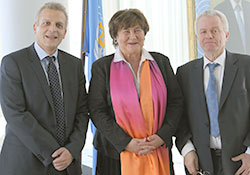Improving maternal and child health: a priority for Bulgaria

WHO
The mortality of children under 5 years of age is 2–2.5% higher in Bulgaria than in the rest of the European Region. Lowering this rate is a key priority for the Ministry of Health of Bulgaria, and 80% of investments by the Ministry in the past 6 months have been for maternal and child care; future public health financing will also focus on infant and maternal health.
On Friday 5 June 2015, Dr Petar Moskov, Minister of Health of Bulgaria, was welcomed to the WHO Regional Office to meet with Dr Zsuzsanna Jakab, WHO Regional Director for Europe, and other senior management to discuss strategies for improving the health and well-being of people in Bulgaria, including child and maternal health. Dr Elvira Foteva, Director of the Directorate for European Coordination, International Activities and Protocol, and Dr Michail Okoliyski, Head of WHO Country Office in Bulgaria, accompanied the Ministry of Health delegation.
The main points discussed in a round-table meeting were:
- public health issues and the determinants of health in Bulgaria,
- noncommunicable diseases and promoting health throughout the life course and
- policy and governance.
Dr Jakab congratulated the Minister of Health for having implemented a ban on smoking in public places. She noted that all the measures outlined in the WHO Framework Convention on Tobacco Control (FCTC) should be addressed to reduce the high prevalence of smoking in Bulgaria.
Another priority for Bulgaria is health care reform to promote an integrated, coordinated health system with a more patient-centred approach.
The way forward
Areas of collaboration between the Regional Office and the Ministry of Health of Bulgaria were specified.
- The Minister of Health will present an action plan incorporating Health 2020 to the Bulgarian Parliament at the end of June.
- WHO will provide technical assistance to improve access to health care services for vulnerable populations, including Roma.
- Dr Moskov expressed interest in developing a new report on "health systems in transition" for Bulgaria and also in EVIPNet (the WHO Evidence-informed Policy Network).
- WHO will provide technical assistance for the introduction of educational programmes for the prevention of tobacco use in schools and for stopping young people from starting smoking.



